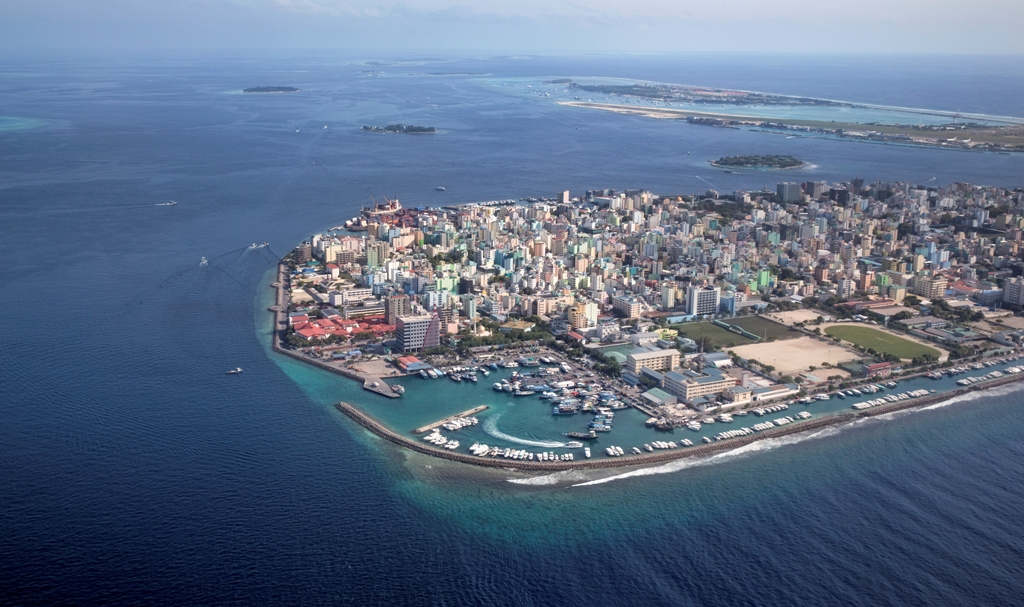 The Maldives has had a troubled few years since it took its first faltering steps towards democracy in 2008.
The Maldives has had a troubled few years since it took its first faltering steps towards democracy in 2008.
A conspiracy to blow up a head of state on a speedboat, a foreign sniper and a trusted deputy arrested—not the latest James Bond film but a few weeks on the Indian Ocean archipelago once best known as a luxury honeymoon destination and more recently as something resembling the later Roman Empire.
The Maldives has had a troubled few years since it took its first faltering steps towards democracy in 2008 under Mohamed Nasheed after the enforced infancy of 30 years of autocracy under Maumoon Abdul Gayoom. But Maldivian politics became even more fraught in late September when the vice-president, Ahmed Adeeb, was arrested and charged with high treason. The government accused him of plotting to assassinate President Yameen Abdul Gayoom (half-brother to the former autocrat) after an explosion on his boat as he returned to the capital from the airport, which is on a separate island. The president was unhurt but his wife, Fathimath Ibrahim, an aide and a bodyguard were injured.
However, the Guardian reported that the FBI, which was called in to investigate the incident, had found no evidence of an improvised explosive device (IED). The FBI said the debris it had studied was from boat parts: ‘There is no conclusive evidence to attribute the explosion on the boat to an IED.’
Then on 2 November, a Maldives official claimed the military had found and deactivated a bomb near the presidential residence, Associated Press (AP) reported. On 4 November Gayoom declared a state of emergency: suspending all basic rights and granting the security forces sweeping powers to arrest suspects. The 30-day emergency was imposed two days before an anti-government protest organised by Nasheed’s Maldivian Democratic Party (MDP), the main opposition group. It was lifted just six days later amid mounting international pressure. On 7 November police in the Maldives charged a Sri Lankan man with planning a sniper attack on Yameen, Reuters reported.
‘Yameen’s increasingly erratic, paranoid and dangerous behaviour is damaging the country and proves he is unfit to be president,’ the MDP said.
It all seemed so promising when the first democratic polls were held in 2008. ‘Anni’ Nasheed, a regular political prisoner under Gayoom, won, but four years later was forced to resign after weeks of disturbances culminated in what most observers would regard as a coup by politicians, security services and radical Islamists.
Contrary to appearances, though, the official commission on the events that led to democracy being postponed indefinitely concluded in 2012: ‘There was no coup on February 7, that Nasheed did not resign under duress, and that police and military officers did not mutiny.’ The international community accepted the return to the status quo ante with surprising ease. The report was also accepted by the Commonwealth Secretary-General, Kamalesh Sharma, who ‘urged all concerned to respect the findings of the commission’.
This was despite one member of the commission, Ahmed Saeed, resigning before the report was published. According to the Colombo Gazette, he declared: ‘There are significant gaps in the draft and does not include evidence and statements given to the commission by many people. I believe remaining silent on the unfolding of events would be an injustice to this nation.’
As Nasheed warned in the New York Times just after he was deposed/resigned (delete according to preference): ‘Long after the revolutions, powerful networks of regime loyalists can remain behind and can attempt to strangle their nascent democracies.’
After Nasheed’s replacement as president, Mohamed Waheed, submitted to pressure for elections, Nasheed won the highest number of votes in the first round of voting in September 2013. A court then cancelled the run-off vote on the grounds that the original poll had not been fair. A fresh election was then called—until police prevented that poll from going ahead. Now Nasheed, the former prisoner turned president, is once again a prisoner, sentenced to 13 years’ imprisonment on terrorism charges.
Adeeb—who has denied any involvement in the explosion—was dumped by his party and former colleagues moved quickly to begin impeachment proceedings. His lawyer has questioned the evidence against him. The irony was that Adeeb had himself risen to power because Gayoom felt he could not trust his first vice-president, Mohamed Jameel, who was impeached, and accused of incompetence and disloyalty. Lawmakers had even voted to lower the minimum age for a vice-president from 35 to 30 to enable Adeeb to take the position.
The Economist said: ‘Adeeb’s arrest is evidence of the frailty of the Maldives’ seven-year experiment with democracy.’ It listed some of the other controversial episodes under Gayoom, including imprisoning the defence minister, Mohamed Nazim, for also attempting to harm the president. New anti-terror legislation was adopted on 27 October. Ostensibly aimed at combating the growing problem of home-grown jihadis, opposition politicians say one purpose is to intimidate the government’s critics.



